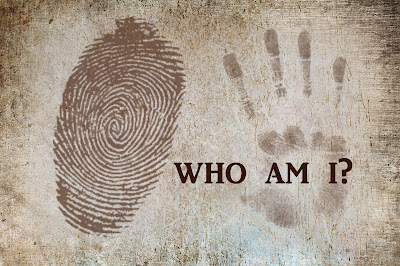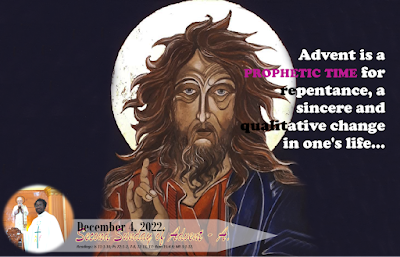WHO AM I? WHO ARE YOU?
August 23, 2020
Twenty-first Sunday in Ordinary Time - A.
READINGS: Is 22:19-23; Ps 138:1-2, 2-3, 6, 8; Rom 11:33-36; Mt 16:13-20.An Akan proverb says, “The only true happiness lies in
knowing who you are. Only he who does not know himself thinks no one knows
him.” And a Wise man adds, “Our identity has already been chosen for us but it
is up to us to accept it, or fight and change it.”
Identity is the distinguishing character or personality of
an individual. It is said to be the qualities, beliefs, personality, looks, and
expressions that make a person. We all have, from that fact, a specific and
singular identity. Besides, the problem of identity is one of the greatest
questions every human being tries to answer. All that we do, all that we say,
and all that we show out to people says and reveals something of who we are.
While some people try all that they can to conceal their identity, others
suffer from being anonymous or unknown.
In the Philippines and in many other countries where people
face EJK (Extra Judicial Killing), oftentimes, those crimes happen with
mistaken identity. One is taken for who he is not, out of confusion, and the
worse happens with no possibility of going back to repair. In other places and
other realities, we speak of identity crises. It is a phenomenon that can be
psychological, social, or political. It the time in which one is brought to put
either to himself or others some relevant questions such as, “Who am I?”
Today’s liturgy of the word, principally the Gospel, comes
with an identity question. The Lord is like asking his disciples, “Who am I?”
The answer to that question will have as a consequence, faith. For, to know the
Lord leads to set one’s trust firmly in him as the solid rock on which our life
is built.
St. Matthew states that, at Caesarea Philippi, Jesus
questioned His disciples: “Who do people say that the Son of Man is?” It is an
inquiry on the rumors and the reactions his actions, teachings, and miracles
produce on those who meet him or hear about him. Rumors, are not all so bad to
listen to. Oftentimes, what people say, tells a lot about us and leads us to
better self-knowledge. Though the advice is to not pay great attention to
rumors, we should not deny the fact that our actions and words leave many
impacts on others that say something about us to them. Therefore, they try to
make for themselves an idea of who we are through what they see and hear of us
and from us.
To the question of the Lord, “Who am I?”, the rumors go,
“Some say John the Baptist, others Elijah, still others Jeremiah or one of the
prophets.” It is nice to see the image people make of Jesus. They say he is
John the Baptist: a contemporary prophet. One whose life has left a certain impact
on the people. His life of austerity, his image as a righteous and simple man
inviting people to conversion and announcing the good news of the proximity of
the kingdom of God and the coming of the Lord. So, the image or apprehension
they have of Jesus is not bad at all. Secondly, Elijah: the greatest and most
awaited prophet of Israel. He was the prophet of all the great revelations, the
great friend of God who had the privilege to see Him face to face, and he was
even taken up to heaven in a miraculous way. Thirdly, Jeremiah, he is, from the
sayings of the exegetes, the perfect image of the Servant of God, the
incarnation of the suffering servant, one of the prophets who, for the sake of
righteousness faced all kind of evils. Here again, the image people make of
Jesus is that of the perfect servant ready to face all kinds of suffering for
justice, truth, and love. And they add any other great prophets. This means
that the Lord has left many positive impacts the life and the understanding of
the people.
But then, Jesus does not limit only on the rumors. He asks,
“But who do you say that I am?” Here is a quest that calls for a confession. It
is not enough to know what people say or think about Jesus. You, what do you
know and say of him? Who is the Lord for you? Peter professes his faith,
"You are the Christ, the Son of the living God.” Knowledge of the Lord
comes from what we believe of him. It is through faith that one gets to know
who Jesus is. We could in that sense paraphrase the “Cogito ergo sum” of
Descartes and say, “I believe; therefore, I know.” For, to believe leads to
deep knowledge, and what we know enforces our dependence on the object or
subject of our faith.
The reaction of Jesus to Peter’s profession of faith
comforts our sayings, “Blessed are you, Simon son of Jonah. For flesh and blood
has not revealed this to you, but my heavenly Father.” Faith is a divine
revelation to man.
You, brethren, who do you say that the Lord is? The first
reading will be of help in our answer about Jesus' identity. He is the one on
whose shoulder is placed the key of David’s house. St. Paul, in the second
reading, will tell us that he is the one from whom all things come. To him
belongs the glory forever.
But then, let’s come to ourselves, you, who is he for you?
Which image or personal experience do you have of him? The current sanitarian
crisis resultant from the COVID-19 pandemic has led many people to reevaluate
their image and understanding of God. Most people have redeveloped their
relationship with God and with the Church. The Lord has become a haven of
peace, a comfort, a firm rock, and an ultimate refuge for many. Even people who
used to not pray to say, “only God can save us from this situation…” Knowing
the Lord has led us to know who we are, our dependence or reliance on Him. We
have come to the conclusion that, without God, without the Lord, we are nothing
and we can do nothing. Our money, our treasure, our power or positions, or
social statue can do nothing for our salvation and life. The bitter, but the
realistic conclusion is that hardly will we get out of this present crisis and
even from any other crisis and trials in our life without God. So, who is the
Lord for you?





Comments
Post a Comment